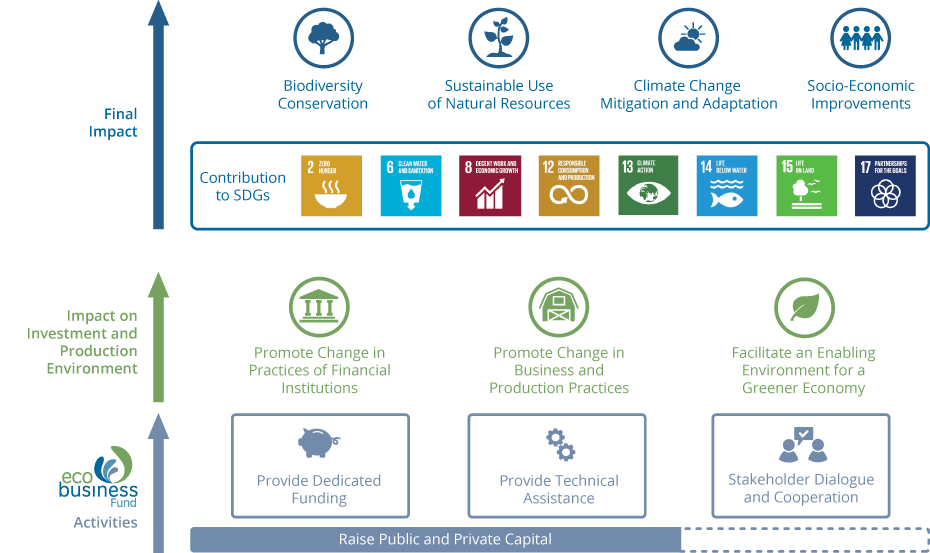Impact

Finance in Motion GmbH

The eco.business Fund has published its fifth Impact Report, “Conserving Biodiversity.”
The report explores how the fund uses a unique combination of investments and technical assistance to realize its mission of conserving biodiversity, climate change mitigation and adaption, and responsible use of natural resources in Latin America and sub-Saharan Africa.
Read the full Impact Report.
The fund aims to promote business and consumption practices that contribute to biodiversity conservation, to the sustainable use of natural resources and to mitigate climate change and adapt to its impacts, in Latin America, the Caribbean, and sub-Saharan Africa.
The fund takes a comprehensive approach to conservation finance that involves not only improving the sustainability of individual practices, but also strengthening the systems that surround and enable these practices to generate deep, long-term impact.
To this end, the fund applies a two-pronged strategy:
Since its inception in December 2014, the eco.business Fund has contributed to:
*Additional impact mobilized by facilitating private sector financing for biodiversity conservation through the use of loan participations as an innovative alternative to get new investors to support the eco.business Fund in its mission.
**Figure as of June 2023 based on eco.business Fund activities in Latin America and the Caribbean
All other figures as of June 2023 based on eco.business Fund activities in Latin America and the Caribbean, and sub-Saharan Africa
Click here to learn about the eco.business Fund's impact methodologies.
The eco.business Fund provides dedicated financing and technical assistance to local financial institutions and businesses who are committed to implementing sustainable practices. Examples of this include measures to contribute to forest and landscape restoration and conservation, such as supporting agroforestry systems, as well as practices that reduce the pressure on natural resources, such as water saving technologies or the sustainable intensification of agriculture.
By raising awareness of the importance of sustainable production practices, engaging with sustainability standards, and connecting conservation finance practitioners, the fund also contributes to building an enabling environment for a greener economy.

To ensure the sustainability of activities receiving funding, all of the recipients of eco.business funding must meet at least one of the following criteria: hold an eligible sustainability standard, or implement one of the sustainable production practices either from the fund’s “Green List” or a practice fully aligned with the fund’s mission.
This approach connects finance with sustainability by directing lending to businesses and producers that hold internationally-recognized sustainability standards. Financial institutions are motivated to take a proactive, inclusive approach to supporting businesses and producers that meet the most demanding voluntary sustainability standards, such as Fairtrade, Rainforest Alliance, FSC, and others. Working with standards constitutes a cost-effective approach to financing sustainable production, as the monitoring and verification of sustainable practices is led by certified and independent bodies. It also enables the fund to deliver deeper analysis of the benefits of its investments and draw upon the standards’ own work on impact measurement.
A few examples are:
In sub-Saharan Africa, the eco.business Fund can also engage in strategic partnerships with commodity traders or other real-sector intermediaries that are focused on improving sustainable sourcing within their value chains through standards or programs that seek to verify the sustainability of suppliers of raw materials and/or third-party producers.
The list of production practices eligible for investment (“Green List”) contains screened and pre-approved practices with a positive impact on sustainability.
A few examples are:
The eco.business Fund continuously monitors and assesses its impact based on key performance indicators that reflect the fund’s impact pathway.
To track progress against these indicators, the fund combines first-hand information from investees with technical parameters from third-party evidence (including scientific literature, data, and reports from international organizations) as well as case studies conducted by the fund. On-site visits to investees help to verify or adjust certain impacts and to gather both qualitative and quantitative impact information.
For the eco.business Fund, assessing impact is just as important as tracking financial performance. It provides a constant feedback loop of how well the fund is progressing towards its goals. It also provides insights and learnings that enable us to continuously fine-tune our strategy to enhance our reach and depth of impact. Impact management is therefore integrated into every step of the investment and technical assistance cycle.
The eco.business Fund also promotes environmentally and socially sound practices in its investment activities, by ensuring that all investees comply with the fund’s environmental and social requirements. Through the eco.business Development Facilities, the fund also provides support to partners to improve environmental and social risk management.

Finance in Motion, eco.business Fund‘s advisor, is a signatory of the Operating Principles for Impact Management (Impact Principles), also aligning eco.business Fund’s impact management system with these recognized industry practices.
Along with an annual disclosure statement, which provides details on the practices applied, the advisor is committed to periodic independent verifications. The latest verification, conducted in 2023 by the specialized consulting firm BlueMark, affirmed strong alignment with the Operating Principles for Impact Management.
Read Finance in Motion’s Operating Principles for Impact Management Disclosure Statement.
The eco.business Fund contributes to achieving the following SDGs through financing focused on biodiversity conservation, the sustainable use of natural resources, and the mitigation of climate change and adaption to its impacts. It works by channelling debt financing via financial intermediaries, real-sector intermediaries, such as commodity buyers or aggregators, as well as directly to eligible businesses:
The fund contributes to strengthening sustainable food production systems and implementing resilient agricultural practices.
The fund supports production practices that reduce the contamination of water streams.
The fund boosts sustainable businesses and jobs through its support to certified companies.
The fund contributes to reduce the environmental footprint of production by supporting the adoption of more sustainable practices.
Through its support to sustainable forestry and to agroforestry practices, the fund contributes both to mitigate climate change and to become more resilient to its effects.
The fund contributes to the preservation of aquatic ecosystems through its support to sustainable fisheries.
The fund contributes to the preservation of ecosystems and biodiversity through its support to deforestation-free activities, forest landscape restoration and to sustainable farming.
The fund mobilizes resources and pools capital for sustainable development and supports partnerships for systemic change.
In pursuing its sustainable investment objective, the eco.business Fund places a priority on effectively managing potential environmental and social (E&S) risks associated with the Fund’s investments. In addition, the Fund integrates environmental, social and governance (ESG) considerations into decision-making and investee engagement. In line with this sustainable investment objective, the Fund falls within the scope of Article 9 of the Regulation (EU) 2019/2088 on the Sustainable Finance Disclosure Regulation (SFDR).
For sustainability-related disclosures in line with the requirements of the SFDR and more information on the Fund’s approach to impact and sustainability, please refer to:
Statement on integration of sustainability risks for a description of relevant sustainability risks and information on the fund’s policies on integration of these risks in its investment decision-making process.
Statement on consideration of principal adverse impacts on sustainability factors for a description of relevant principal adverse impacts and the policies and actions to identify, prioritise, and address such impacts as well as a summary of the fund’s engagement policies.
Statement on sustainable investment objective for a description of the sustainable investment objective of the Fund and its (investment) strategy to attain that objective, along with the approach to measuring, monitoring, and managing impact.
The eco.business Fund has published its fifth Impact Report, “Conserving Biodiversity.”
The report explores how the fund uses a unique combination of investments and technical assistance to realize its mission of conserving biodiversity, climate change mitigation and adaption, and responsible use of natural resources in Latin America and sub-Saharan Africa.
Read the full Impact Report.
The fund aims to promote business and consumption practices that contribute to biodiversity conservation, to the sustainable use of natural resources and to mitigate climate change and adapt to its impacts, in Latin America, the Caribbean, and sub-Saharan Africa.
The fund takes a comprehensive approach to conservation finance that involves not only improving the sustainability of individual practices, but also strengthening the systems that surround and enable these practices to generate deep, long-term impact.
To this end, the fund applies a two-pronged strategy:
Since its inception in December 2014, the eco.business Fund has contributed to:
*Additional impact mobilized by facilitating private sector financing for biodiversity conservation through the use of loan participations as an innovative alternative to get new investors to support the eco.business Fund in its mission.
**Figure as of June 2023 based on eco.business Fund activities in Latin America and the Caribbean
All other figures as of June 2023 based on eco.business Fund activities in Latin America and the Caribbean, and sub-Saharan Africa
Click here to learn about the eco.business Fund's impact methodologies.
The eco.business Fund provides dedicated financing and technical assistance to local financial institutions and businesses who are committed to implementing sustainable practices. Examples of this include measures to contribute to forest and landscape restoration and conservation, such as supporting agroforestry systems, as well as practices that reduce the pressure on natural resources, such as water saving technologies or the sustainable intensification of agriculture.
By raising awareness of the importance of sustainable production practices, engaging with sustainability standards, and connecting conservation finance practitioners, the fund also contributes to building an enabling environment for a greener economy.

To ensure the sustainability of activities receiving funding, all of the recipients of eco.business funding must meet at least one of the following criteria: hold an eligible sustainability standard, or implement one of the sustainable production practices either from the fund’s “Green List” or a practice fully aligned with the fund’s mission.
This approach connects finance with sustainability by directing lending to businesses and producers that hold internationally-recognized sustainability standards. Financial institutions are motivated to take a proactive, inclusive approach to supporting businesses and producers that meet the most demanding voluntary sustainability standards, such as Fairtrade, Rainforest Alliance, FSC, and others. Working with standards constitutes a cost-effective approach to financing sustainable production, as the monitoring and verification of sustainable practices is led by certified and independent bodies. It also enables the fund to deliver deeper analysis of the benefits of its investments and draw upon the standards’ own work on impact measurement.
A few examples are:
In sub-Saharan Africa, the eco.business Fund can also engage in strategic partnerships with commodity traders or other real-sector intermediaries that are focused on improving sustainable sourcing within their value chains through standards or programs that seek to verify the sustainability of suppliers of raw materials and/or third-party producers.
The list of production practices eligible for investment (“Green List”) contains screened and pre-approved practices with a positive impact on sustainability.
A few examples are:
The eco.business Fund continuously monitors and assesses its impact based on key performance indicators that reflect the fund’s impact pathway.
To track progress against these indicators, the fund combines first-hand information from investees with technical parameters from third-party evidence (including scientific literature, data, and reports from international organizations) as well as case studies conducted by the fund. On-site visits to investees help to verify or adjust certain impacts and to gather both qualitative and quantitative impact information.
For the eco.business Fund, assessing impact is just as important as tracking financial performance. It provides a constant feedback loop of how well the fund is progressing towards its goals. It also provides insights and learnings that enable us to continuously fine-tune our strategy to enhance our reach and depth of impact. Impact management is therefore integrated into every step of the investment and technical assistance cycle.
The eco.business Fund also promotes environmentally and socially sound practices in its investment activities, by ensuring that all investees comply with the fund’s environmental and social requirements. Through the eco.business Development Facilities, the fund also provides support to partners to improve environmental and social risk management.

Finance in Motion, eco.business Fund‘s advisor, is a signatory of the Operating Principles for Impact Management (Impact Principles), also aligning eco.business Fund’s impact management system with these recognized industry practices.
Along with an annual disclosure statement, which provides details on the practices applied, the advisor is committed to periodic independent verifications. The latest verification, conducted in 2023 by the specialized consulting firm BlueMark, affirmed strong alignment with the Operating Principles for Impact Management.
Read Finance in Motion’s Operating Principles for Impact Management Disclosure Statement.
The eco.business Fund contributes to achieving the following SDGs through financing focused on biodiversity conservation, the sustainable use of natural resources, and the mitigation of climate change and adaption to its impacts. It works by channelling debt financing via financial intermediaries, real-sector intermediaries, such as commodity buyers or aggregators, as well as directly to eligible businesses:
The fund contributes to strengthening sustainable food production systems and implementing resilient agricultural practices.
The fund supports production practices that reduce the contamination of water streams.
The fund boosts sustainable businesses and jobs through its support to certified companies.
The fund contributes to reduce the environmental footprint of production by supporting the adoption of more sustainable practices.
Through its support to sustainable forestry and to agroforestry practices, the fund contributes both to mitigate climate change and to become more resilient to its effects.
The fund contributes to the preservation of aquatic ecosystems through its support to sustainable fisheries.
The fund contributes to the preservation of ecosystems and biodiversity through its support to deforestation-free activities, forest landscape restoration and to sustainable farming.
The fund mobilizes resources and pools capital for sustainable development and supports partnerships for systemic change.
In pursuing its sustainable investment objective, the eco.business Fund places a priority on effectively managing potential environmental and social (E&S) risks associated with the Fund’s investments. In addition, the Fund integrates environmental, social and governance (ESG) considerations into decision-making and investee engagement. In line with this sustainable investment objective, the Fund falls within the scope of Article 9 of the Regulation (EU) 2019/2088 on the Sustainable Finance Disclosure Regulation (SFDR).
For sustainability-related disclosures in line with the requirements of the SFDR and more information on the Fund’s approach to impact and sustainability, please refer to:
Statement on integration of sustainability risks for a description of relevant sustainability risks and information on the fund’s policies on integration of these risks in its investment decision-making process.
Statement on consideration of principal adverse impacts on sustainability factors for a description of relevant principal adverse impacts and the policies and actions to identify, prioritise, and address such impacts as well as a summary of the fund’s engagement policies.
Statement on sustainable investment objective for a description of the sustainable investment objective of the Fund and its (investment) strategy to attain that objective, along with the approach to measuring, monitoring, and managing impact.